| Article ID | Journal | Published Year | Pages | File Type |
|---|---|---|---|---|
| 5884195 | Journal of Cardiothoracic and Vascular Anesthesia | 2014 | 6 Pages |
ObjectivesRecently, evidence of reduction in mortality due to the use of volatile agents during cardiac surgery led to an increase in their use during cardiopulmonary bypass (CPB). Because this technique could be beneficial to patients, but might present several hazards to new users, the authors decided to perform a systematic review of the main problems and complications.DesignSystematic literature review.SettingHospital.ParticipantsAdults undergoing cardiac surgery with use of volatile anesthetic agents during CPB.InterventionSeveral databases were searched for pertinent studies to identify all reports on the adverse events of using volatile agents during CPB and all randomized controlled trials using volatile agents during CPB.Measurements and Main ResultsSix nonrandomized trials reporting adverse events or complications with the use of volatile agents during CPB for cardiac surgery were identified: 2 reporting low transfer of isoflurane to the blood with diffusion membrane oxygenators; 2 reporting iatrogenic causes of damage after spilling liquid isoflurane onto the surface of the membrane oxygenators while filling the vaporizer; and 2 suggesting that the use of volatile agents during CPB increased the pollution of the room and the risk of occupational exposure of the operating room staff. On the other hand, no adverse event was reported in 19 studies that randomized 1,195 patients to receive isoflurane, desflurane, or sevoflurane during CPB.ConclusionIt is mandatory for industry to provide safe and easy-to-use devices to administer volatile agents during CPB with the standard membrane oxygenators.
